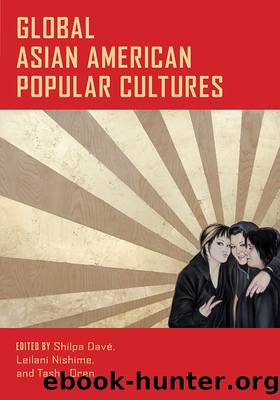Global Asian American Popular Cultures by Shilpa Dave LeiLani Nishime Tasha Oren

Author:Shilpa Dave, LeiLani Nishime, Tasha Oren [Shilpa Dave, LeiLani Nishime, Tasha Oren]
Language: eng
Format: epub
Tags: Nonfiction, Social & Cultural Studies, Social Science, Cultural Studies, Ethnic Studies
ISBN: 9781479837496
Publisher: NYU Press
Published: 2016-05-16T04:00:00+00:00
State of Tourism
For Jon Goss, the narrative of the tourist scapes of Hawaiâi follows a cyclical arc of âinnocence, corruption, and redemption.â10 This story arc is complicit with the official history of Hawaiâi from the vantage of the imperial culture in which innocent native culture is corrupted by colonialism but redeemed through its attachment to the United States. In the 1960s tourist films of Hawaiâi, this redemption is achieved and displayed through the expansion of the tourist industry and thus economic independence of the former colony. And tourist development coincides with individual character development. In Blue Hawaii, Chad describes his assertion of financial independence from his parents as his âdeclaration of independence.â The narrative encodes an allegory about the status of Hawaiâi for the mainland viewer, as paradoxically attaining independence as it becomes moored to the united States. In this case, independence is the consequence of ever more tourism. Chad has to reconcile the paradoxes and conflicts in his quest for the pleasures of leisure by shirking the duties of work. His desire is complicit with the tourist desire to throw off the yoke of industrialism and find freedom in the experience of pure pleasure. Or as Maile reminds Chad, whom she finds napping on a surfboard: âYou canât spend the rest of your life on a surfboard.â Chad will find a way to bring together the opposing forces of leisure and work by making his leisure into workâjust as he integrates a number of other oppositions that he encounters.
Chad searches for a viable career in the tourist industry working for a small tour guide company instead of working in agricultural business raising pineapples with his father. His search for a lucrative and independent business allegorizes the shift in Hawaiâi from the plantation economy to tourism. His maturation to independence allegorizes what is deemed as the âeconomic maturationâ of Hawaiâi. He embodies all of the major industries and institutions on the islands: military, agriculture, and tourism. He refuses the former two for the latter, asserting that âHawaii has a big future and I want to be a part of it,â referring to the major expansion of the tourist enterprise in the islands. The opportunities of agriculture have been fully tapped and are deemed part of an inert past, while tourism promises a whole new range of possibilities. But his initial refusal to join his family business is only transitional and will be revised when Chad realizes that he can combine both industries and integrate the interests of both generations; he fulfills his fatherâs expectations and his own entrepreneurial desires by uniting them. He links his tour company with the work of his fatherâs firm, the Southern Pineapple Company, by offering tours to its employees and arranging incentive trips. His idea is to provide reinvigorating island respites for workers so that they might return to the mainland and work more efficiently.
Chad initially works for another tour company where he learns the ropes of the industry and proves his potential for mature development.
Download
This site does not store any files on its server. We only index and link to content provided by other sites. Please contact the content providers to delete copyright contents if any and email us, we'll remove relevant links or contents immediately.
Cecilia; Or, Memoirs of an Heiress — Volume 1 by Fanny Burney(32558)
The Great Music City by Andrea Baker(32019)
Cecilia; Or, Memoirs of an Heiress — Volume 2 by Fanny Burney(31956)
Cecilia; Or, Memoirs of an Heiress — Volume 3 by Fanny Burney(31942)
We're Going to Need More Wine by Gabrielle Union(19046)
All the Missing Girls by Megan Miranda(16029)
Pimp by Iceberg Slim(14508)
For the Love of Europe by Rick Steves(14121)
Bombshells: Glamour Girls of a Lifetime by Sullivan Steve(14076)
Talking to Strangers by Malcolm Gladwell(13370)
Norse Mythology by Gaiman Neil(13365)
Fifty Shades Freed by E L James(13241)
Mindhunter: Inside the FBI's Elite Serial Crime Unit by John E. Douglas & Mark Olshaker(9343)
Crazy Rich Asians by Kevin Kwan(9292)
The Lost Art of Listening by Michael P. Nichols(7506)
Enlightenment Now: The Case for Reason, Science, Humanism, and Progress by Steven Pinker(7313)
The Four Agreements by Don Miguel Ruiz(6765)
Bad Blood by John Carreyrou(6621)
Weapons of Math Destruction by Cathy O'Neil(6281)
